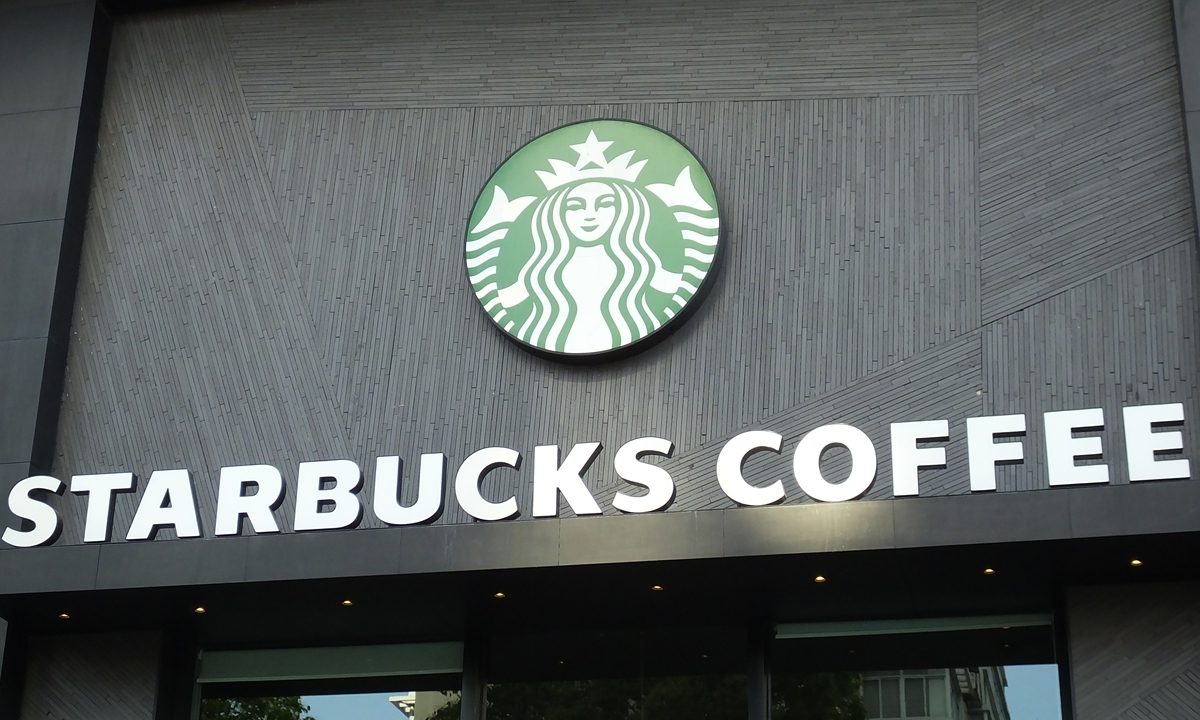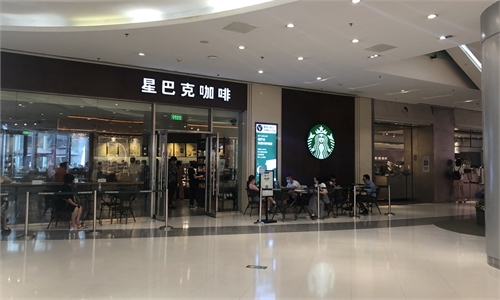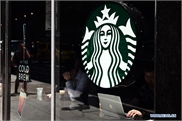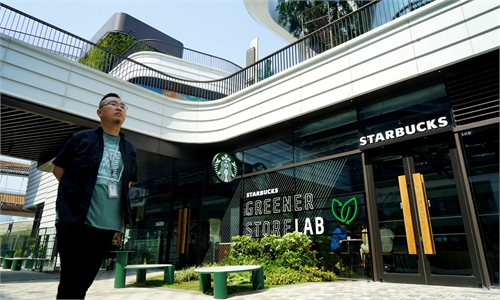Starbucks urged to rectify, vows to inspect all stores after food expiration scandal

Photo: VCG
The market supervision authority in Wuxi, East China's Jiangsu Province held talks with coffee giant Starbucks on Monday, after the company's two shops in the city were exposed in a food scandal of using expired ingredients for drinks.
The Market Supervision Bureau of Wuxi said it has launched inspections to 82 stores in the city and discovered several problems including employees who failed to wear hats and incomplete disinfection. The bureau asked the company to rectify its problems.
Starbucks' headquarters in China told The Beijing News late Monday that the company will conduct examinations of all stores in the country.
The scandal was uncovered by two reporters from The Beijing News, who carried out undercover investigations at two Starbucks shops in Wuxi from late October to mid-November. The report was published on Monday.
In a video clip that went viral, one staffer used unsealed chocolate liquid and matcha liquid to make drinks, despite the labels on the bottles showing the materials were expired.
Labels with the expiration dates on containers of black tea and butter were torn off as the ingredients expired, and for those about to expire, staffers would replace the old labels with new ones, said the report.
Unsealed bread that should have been taken off the counter on the next day was put out for sale, the video showed. The reporters also found that employees used cleaning cloths for the counter to mop the dust bins.
Starbucks China said on Sina Weibo on Monday that the company was shocked about the food safety problems reported. It said it shut down the two shops involved and launched an investigation immediately.
"Being in the Chinese market for 22 years, Starbucks has always devoted itself to strict food safety standards with zero tolerance for food safety problems," Starbucks said in the post. It said the company welcomes continuing supervision from the society and the media.
The report sparked wide controversy among the Chinese public with relevant discussion trending on Chinese social media Sina Weibo. Hashtag "Starbucks changed food label and used expired food ingredients" attracted wide attention in China. As of press time, the hot topic had gained more than 110 million views on Sina Weibo.
"I'm so shocked that the shop used expired ingredients to make drinks. After all, the average price of more than 30 yuan (roughly $5) for each drink isn't low and I've always trusted this brand," said one netizen.
Another said that there must be huge loopholes in the company's management model, and urged Starbucks to publish the investigation results, as well as rectify the rules as soon as possible.
Nanjing's market supervision bureau said it had launched a special examination of Starbucks shops, local media Modern Express reported on Monday.
Yet some consumers also pointed out that Starbucks showed its sincerity by responding to such criticism so rapidly. French luxury brand Dior was previously mired in hot water as it failed to clarify its position several days after a controversial photo, which was deemed as "uglify Chinese" shot by well-known Chinese photographer Chen Man, was displayed at its Shanghai fashion exhibition earlier last month.
The quick response shows that Starbucks pays close attention to the issue, as well as the Chinese market, because it concerns not only consumers' interests but the company's image and future development in China, Bai Ming, deputy director of the International Market Research Institute at the Chinese Academy of International Trade and Economic Cooperation, told the Global Times on Monday.
"As a company highly valuing food safety, Starbucks should inspect itself. Having strict standards and implementing them well are different things. The public should listen to what it said and watch what it does," Bai said.
"Regulatory methods should also be improved to make sure such scandals won't be repeated," added Bai.
According to its official website, Starbucks has more than 5,100 shops in more than 200 cities across China. The company reported third-quarter revenue in China of $910 million in the 2021 fiscal year, an increase of 45 percent compared with the same period last year.

Photo: VCG
The market supervision authority in Wuxi, East China's Jiangsu Province held talks with coffee giant Starbucks on Monday, after the company's two shops in the city were exposed in a food scandal of using expired ingredients for drinks.
The Market Supervision Bureau of Wuxi said it has launched inspections to 82 stores in the city and discovered several problems including employees who failed to wear hats and incomplete disinfection. The bureau asked the company to rectify its problems.
Starbucks' headquarters in China told The Beijing News late Monday that the company will conduct examinations of all stores in the country.
The scandal was uncovered by two reporters from The Beijing News, who carried out undercover investigations at two Starbucks shops in Wuxi from late October to mid-November. The report was published on Monday.
In a video clip that went viral, one staffer used unsealed chocolate liquid and matcha liquid to make drinks, despite the labels on the bottles showing the materials were expired.
Labels with the expiration dates on containers of black tea and butter were torn off as the ingredients expired, and for those about to expire, staffers would replace the old labels with new ones, said the report.
Unsealed bread that should have been taken off the counter on the next day was put out for sale, the video showed. The reporters also found that employees used cleaning cloths for the counter to mop the dust bins.
Starbucks China said on Sina Weibo on Monday that the company was shocked about the food safety problems reported. It said it shut down the two shops involved and launched an investigation immediately.
"Being in the Chinese market for 22 years, Starbucks has always devoted itself to strict food safety standards with zero tolerance for food safety problems," Starbucks said in the post. It said the company welcomes continuing supervision from the society and the media.
The report sparked wide controversy among the Chinese public with relevant discussion trending on Chinese social media Sina Weibo. Hashtag "Starbucks changed food label and used expired food ingredients" attracted wide attention in China. As of press time, the hot topic had gained more than 110 million views on Sina Weibo.
"I'm so shocked that the shop used expired ingredients to make drinks. After all, the average price of more than 30 yuan (roughly $5) for each drink isn't low and I've always trusted this brand," said one netizen.
Another said that there must be huge loopholes in the company's management model, and urged Starbucks to publish the investigation results, as well as rectify the rules as soon as possible.
Nanjing's market supervision bureau said it had launched a special examination of Starbucks shops, local media Modern Express reported on Monday.
Yet some consumers also pointed out that Starbucks showed its sincerity by responding to such criticism so rapidly. French luxury brand Dior was previously mired in hot water as it failed to clarify its position several days after a controversial photo, which was deemed as "uglify Chinese" shot by well-known Chinese photographer Chen Man, was displayed at its Shanghai fashion exhibition earlier last month.
The quick response shows that Starbucks pays close attention to the issue, as well as the Chinese market, because it concerns not only consumers' interests but the company's image and future development in China, Bai Ming, deputy director of the International Market Research Institute at the Chinese Academy of International Trade and Economic Cooperation, told the Global Times on Monday.
"As a company highly valuing food safety, Starbucks should inspect itself. Having strict standards and implementing them well are different things. The public should listen to what it said and watch what it does," Bai said.
"Regulatory methods should also be improved to make sure such scandals won't be repeated," added Bai.
According to its official website, Starbucks has more than 5,100 shops in more than 200 cities across China. The company reported third-quarter revenue in China of $910 million in the 2021 fiscal year, an increase of 45 percent compared with the same period last year.



